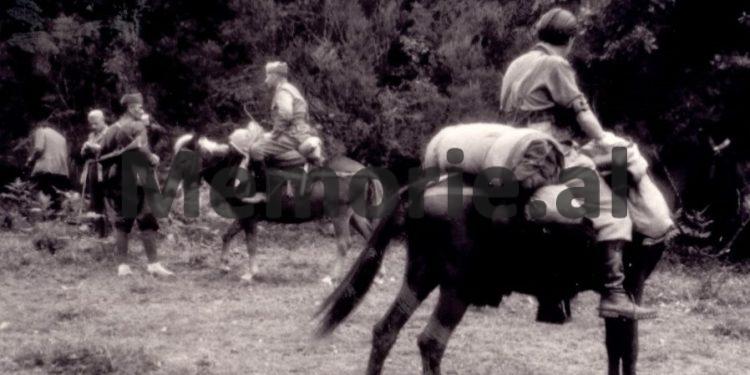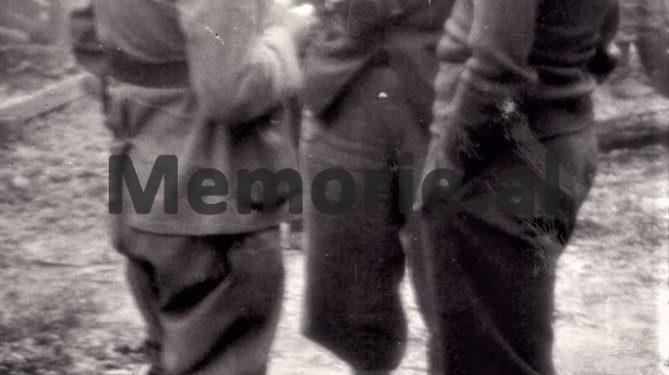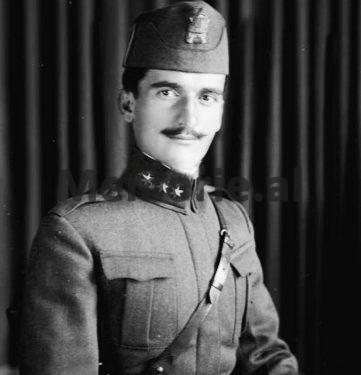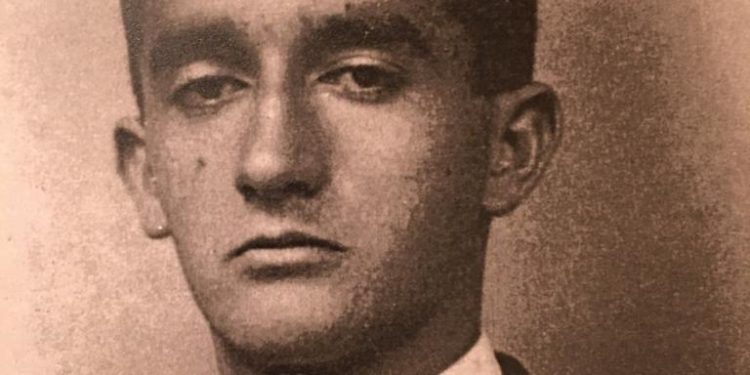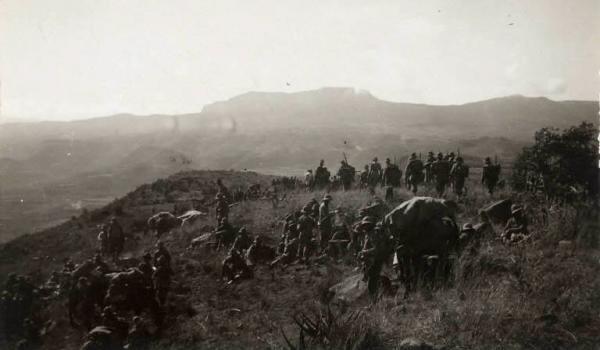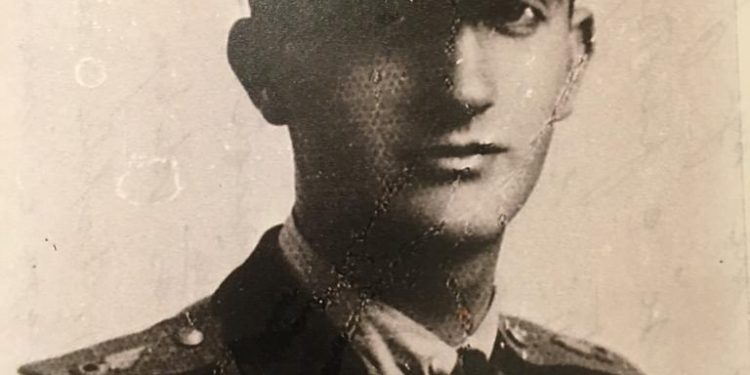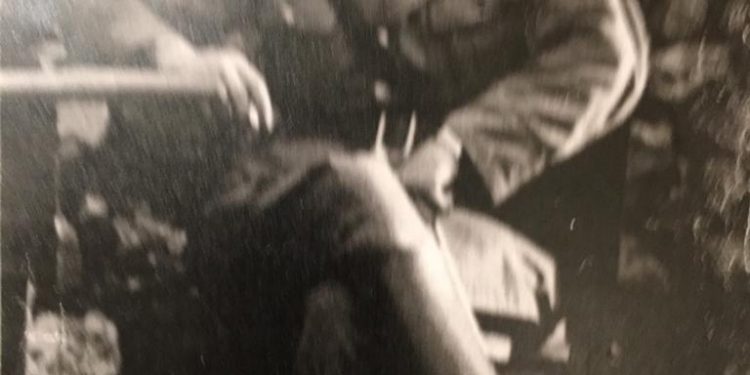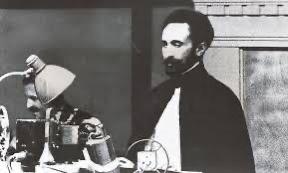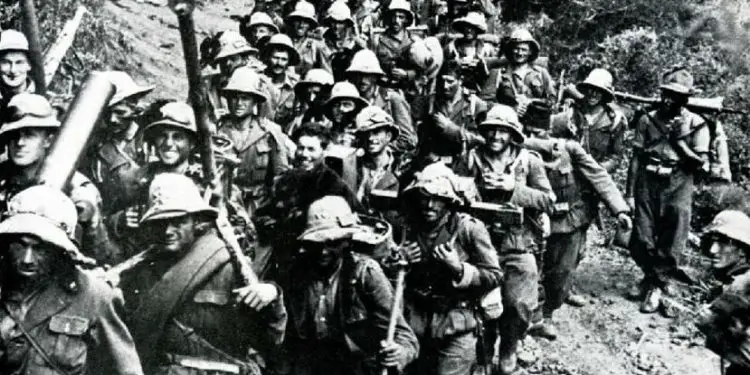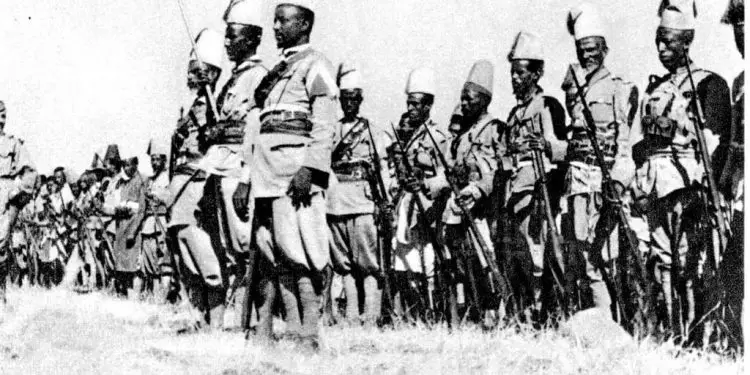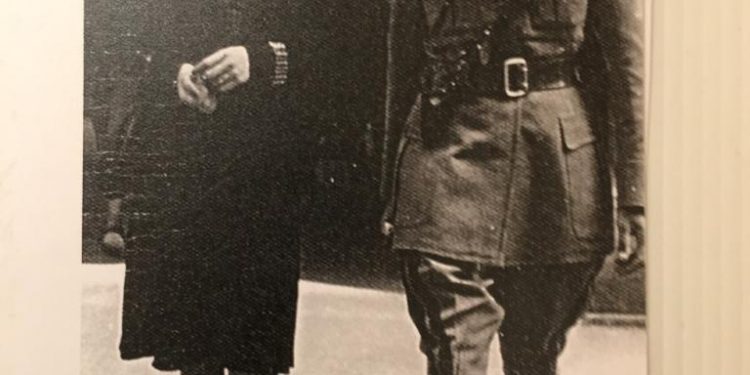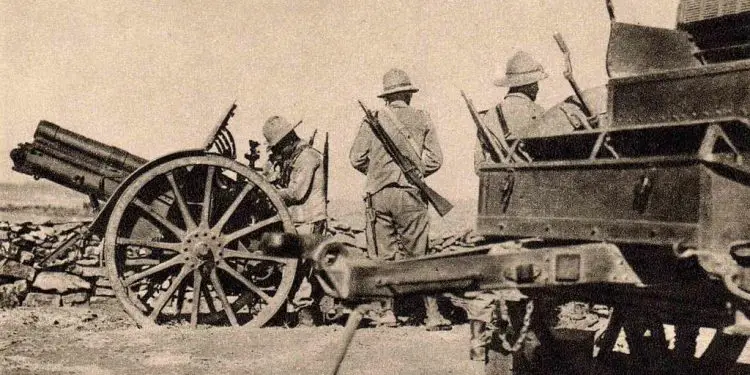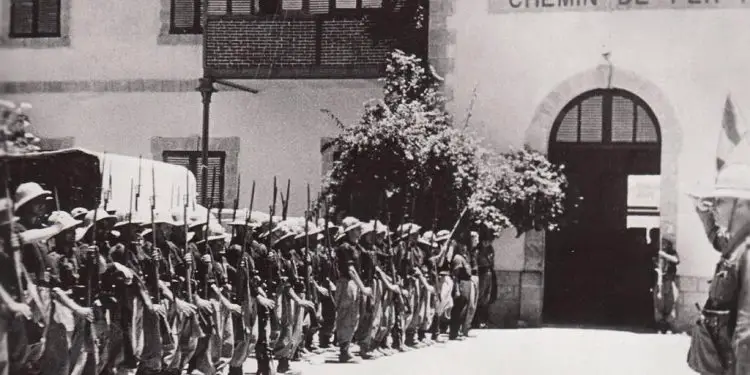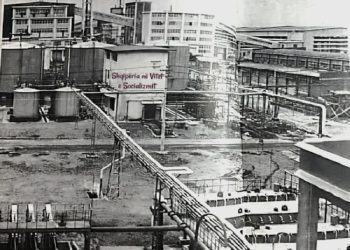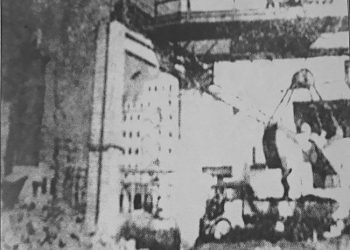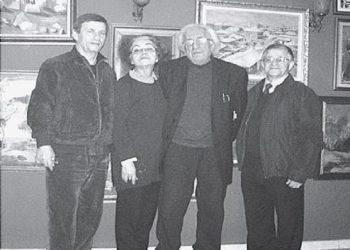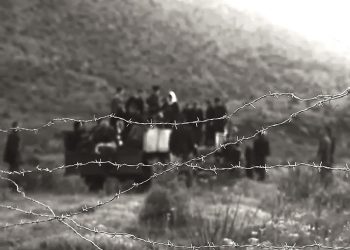Dashnor Kaloçi
Memorie.al publishes the unknown story of the general, Prenk Pervizi, originally from the village of Skuraj i Kurbinit, who after graduating from the Military Academy of Turin in Italy and served as a soldier at the General Staff of the National Army of the Zog Monarchy, in 1935 , was sent on an observation mission to the Abyssinian War. Unknown memories of General Perviz for the period of several months he served as a member of an international commission of observers, which also included the American T. Palmer, the Romanian, L. Dinerau, the Hungarian F. Borzovsky, the Portuguese B. Herrera, the Austrian K. von Kirsche , the Japanese K. Sakamuri, all with the rank of colonel, where before departure, he had received them in the audience, Benito Mussolini himself, in Naples.
Sending some commandos of the Albanian Army to several different countries of the world, such as: Bosnia, Afghanistan, Iraq, as well as those of other peacekeeping missions that our military has conducted in some hotspots of conflicts around the globe after the ’90s have not been the only cases where they have gone to the aid of other countries. Even during the period of Enver Hoxha’s communist regime, although in positions and circumstances completely different from those of the last three decades, the Albanian military has participated with secret missions in some countries of the world, such as Korea, Vietnam, Laos, etc.
But what has not been very well known until today, has been the participation of some Albanian soldiers of the Zog Monarchy, in the military conflicts that preceded the Second World War in the ’30s. One of them was the famous General Prenk Pervizi, the former Commander of the National Defense in 1943-44 (or as he was otherwise known, Minister of Defense), who after graduating from the Military Academy of Turin, in 1935 when held the rank of colonel at the General Staff of the Albanian Army headed by General Xhemal Arianiti, was sent on a mission as an observer to Ethiopia.
Regarding that mission, Prenk Pervizi, sucker of one of the most famous families and with a patriotic past of the Kurbin area (his uncle, Gjin Pjetër Pervizi, raised the flag on November 28, 1912 in Milot and for his patriotic activity of was also decorated by the communist regime of Enver Hoxha), left his memories, which his son, 92-year-old Lek Pervizi, (living in Brussels) sent exclusively for publication to the editorial office of Memorie.al, and a parts of them, along with a brief history of the Pervizi family, we are publishing below in this article.
General Perviz’s Memoirs: My Knowledge of Ethiopia
“Before leaving for the mission assigned to me by the Ministry of Defense and King Zog himself, with whom I had a special audience, I had to get some data on Abyssinia, or rather on Ethiopia, led by the Emperor Halie Salasie, nicknamed Negus Negusti, (king of kings), a state near East Africa at the bottom of the Red Sea, with which Italy had been in conflict since October 1935. Ethiopia was located between two colonies that Italy had occupied since 1885 -1887, Eritrea in the very, and Somalia in the south.
Until then I had clear knowledge of the geographical Atlas I kept at home. But for the history of that country and that people, I had not had the opportunity to know more. So to cut it short, I opened Larus, where I got some notifications I needed. Named Abisni, it was called the central plateau of Ethiopia, which ranged from 2,000 to 4,500 feet [4,500 m] above sea level. The capital of Ethiopia itself, Addis Ababa, was located at an altitude of over 2500 meters.
The Italians had wanted to occupy it since 1885-87. They had first invaded Eritrea, and when they invaded Ethiopia they found themselves facing the strong resistance of the native primitive tribes led by King Menelik II, who in 1887 routed General Baratieri’s army at Adua. Italy’s goals at the time failed. But Mussolini’s Italy decided to attack again, to end the invasion of that African country. Italy wanted “vital space” (living space), as did Germany, so it wanted to have its own colonies, such as England, France, Spain, Portugal, to Belgium and the Netherlands.
The Duke met me in Naples
As I was getting some essential information about my African mission as a member of an international observer commission, I joined other members in Naples, all colonels: American T. Palmer, Romanian, L. Dinerau, Hungarian F. Borzovsky, Portuguese B Herrera, Austrian K. von Kirsche, Japanese K. Sakamuri. In Naples I was provided with colonial clothes, suitable to withstand that climate and those conditions. I had taken with me an Agfa camera, which would be very useful for me to capture moments, characters, military and civilian personalities, the primitive life of the natives, the characteristic images, our life as a group of foreign observers, etc. In Naples we had the visit of the Duchess himself, Benito Mussolini, who expressed his gratitude for our countries that had accepted me as an observer in this war, and wished us a good trip and mission.
The League of Nations had condemned Italy’s intervention in Ethiopia and imposed a blockade (sanctions), so that many countries, even Germany, did not send observers. On November 10, 1935, after a journey of 4,000 km on a cruiser, crossing the Suez Canal and the entire Red Sea, we reached Asmara, from where we were escorted to the Eritrean front, which was the northern front near the headquarters of General De Bono. He was later replaced by General Badoglio. After a while we crossed to the southern front, near the headquarters of General Graziani. But we were able to transfer and move across different points on the battle fronts.
On the war front
Throughout the war, we were able to move freely by military aircraft and other motorized vehicles. That war, as is now known, ended with the victory of the Italian army, and so Victor Emmanuel III received the crown and title of Emperor of Ethiopia. General Graziani was appointed Vice-King of Ethiopia and Badoglio was promoted to the rank of Marshal of Italy.
The conquest of Italy was the first step that could be followed by other steps towards the realization of the Duchess’s utopian dream, Benito Mussolini, to create the Roman Empire. An indisputable threat to the Balkan countries, where the first victim could be Albania, as happened in the time of Teuta Illyria when the Balkans were attacked and occupied by the Romans. The first fifteen days constitute for almost all Italian units a period of rest, systematization and change of positions achieved.
Radiation services (supply) had developed their usual functions to meet the needs of the body and at the same time with the top and fulfill the logical basis. During this period, as the official communiqués had announced, on the left wing of the Italian ranking, the strict cleansing action continued between the Gjana provinces, Gheralta and Tembien. At the same time, Italian aviation announced that major enemy forces were approaching the Italian front south of Makalle. Therefore, air surveillance was intensified and in the meantime other bombing operations were prepared.
Severe bombing
One of these bombing operations took place on an opposing column, probably of Goggiam Ras Rasmir’s power, marching in Uoghera in the direction of Debarek. After that, on December 6, a powerful bombardment was carried out around Dessie, on the buildings used for military purposes and on the large tents located around the apartments. In the days following the bombing, some tendentious news spread by Addis Ababa wanted to make us believe that the city had been unprotected and that among the targets hit were hospitals and the Red Cross. But, as it turned out from reliable information, arrivals from the Abyssinian capital itself, it was proved that: on the contrary, thousands of soldiers were concentrated in the vicinity of the city.
The numerous anti-aircraft weapons that went into action against the Italian aircraft proved that the air attack was fully anticipated and, therefore, constituted a natural combat action. The photographs taken on the spot by the returned planes clearly proved that the bombing was carried out exclusively on those points that were of military importance: the gunpowder, the ghebi, the aviation field, the telephone exchange, the military tents, etc.
The Red Cross hospital, although it turned out to be occupied by non-health service elements, was not bombed. It was also seen that many tents and aviation fields were unjustly covered with Red Cross signs.
General Perviz died in 1977 in Brussels, while his family lived for 45 years in exile in the camps of Myzeqe
The famous general, Preng Pervizi who in 1935 in the framework of an international commission of observers was sent to closely follow the fighting of the Italian army in Abyssinia, from September 1943 to August 1944, held the post of Commander-in-Chief. of the Albanian National Army, or as he was otherwise known, Minister of War. After resigning from that position, which happened due to some conflicts he had with the senior command of the German army in Albania, General Pervizi went to the mountains joining the nationalist forces of Legality, which were under the command of Major Abaz Kup. Shortly afterwards, in mid-September 1944, an Anglo-American military mission led by Colonel Julian Emery was attached to him, with whom Perviz parted ways only in the last days of November 1944. Perviz refused to leave. from Albania like many other nationalists, but called on his supporters to stand in the mountains awaiting the Anglo-American landing, to make possible the overthrow of the communist government of Colonel-General Enver Hoxha. In 1945, while hiding in the Kurbin Mountains near the village of Skuraj, which was also his birthplace, he sent two letters to the Anglo-American and French representations in Tirana, urging them to intervene forcefully in Albania. to prevent the unprecedented terror exercised by Enver Hoxha’s communist government against their former political opponents. Seeing the hopeless situation, with the help of his former driver, Llazi Sterjo from Korça, in 1946 he left Albania, fleeing to Greece, somewhere from the villages of Korça. From 1948 to 1977, Prenka lived in Brussels where he died alone away from his family (mother, wife and three sons, Valentini, Genci and Leka with their families), which the communist regime of Enver Hoxha held internees for almost half a century in the villages of Lushnja, until 1991. /Memorie.al




